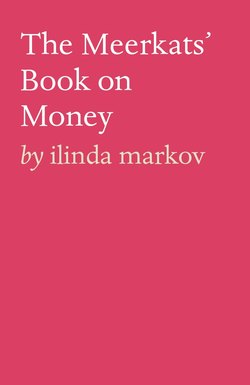Читать книгу The Meerkats’ Book on Money - Ilinda Markov - Страница 8
На сайте Литреса книга снята с продажи.
LIAM
ОглавлениеNow let’s keep our cool and go back to money’s early provenience dating two and a half thousand years ago when on the Greek Aegean shore a new god was born. It was not far away from Paphos on the island of Cyprus where the goddess of love and beauty Aphrodite was born from the sea. The new god was named Plutus, Wealth and his power was so enormous, it rivalled the power of Zeus. The scene was set for an eternal and dramatic fight over the hearts, souls and minds of people between the beautiful, fragile, gentle and easily hurt goddess of love Aphrodite and the arrogant ruthless controlling omnipowered god of money Plutus, both governing dreams and passions, both defying lives, happiness and death.
Both making us ask the question: To FEEL or to FILL?
Money emerged like a unifying measure element like metres and kilos. Nobody has seen a kilo, it could be a bulge of belly fat or a packet of sugar we have consumed in a week. You put kilos on and off, you get bigger or slimmer depending on your life style. The reality behind one Australian dollar or one Swiss frank is flexible. You have the coin but the measurement behind it can be anything in the context of the current economic status: two apples, a packet of chewing gum, a ride on a rollercoaster. Money tokens used over centuries were shells, pearls and jades; gold, silver, copper and bronze coins or the ones popular in China knife- and spade-shaped. I am particularly impressed by what I find so symbolic in these shapes as infallible tools for obtaining wealth. Because we all can consume money in spades. Sorry it didn’t cross my mind that spade here might stand for a labour tool. As for the knife it’s obvious, its significance is not dualistic.
At the time of the first Olympics when men (sorry girls) were competing for no money prize but a plate of palm leaves, (later they started to receive 500 drachmas per a champion), Aristophanes, the ancient Greek playwright put some interesting words in the mouth of his hero Chremylus when the latter addressed no other but the god Plutus, Wealth: “No one ever gets their fill of you.” The line continues with a so-too-well predictable example like, “If someone gets his hands on thirteen talents, he hankers all the more to get sixteen; and if he achieves that, he wants forty, or else he says life is not worth living,” It’s like being around the beer draft, all you want is more and more beer and you don’t know what’s enough at least until the following morning. Here talent is not what you call a kid who writes brilliant essays. In this case talent is a unit of value equal to the amount of 26 kg of pure silver. How about that?
This shows that the idea of money as a thing of everybody’s diet could be found far back in history around the time when money had been invented, minted and put in circulation. A tempting food that you can watch in the hands of gourmet chef traders who creates chef-d’oeuvres and hour-d’oeuvres and what not for the most delicious meal but also a food you can choke on if you are not careful enough if you bite off more than you can chew and stuff yourself to death.
It’s well known that literature provides us with one of the best historic records so this walk back to the ancient Greek drama, you know from the time when women were not allowed to go on stage and all female roles were performed by men, comes in handy.
Aristophanes’ play was actually called Plutus (Wealth) and alongside this character appears the goddess of poverty Penia claiming that without poverty there would be no slaves and no fine and luxury foods as nobody would work if everyone was rich. Towards the end of the play even the Olimpian gods are pissed off because all humans follow Plutus and they are but forgotten. We are talking here of 408 BC. Has anything changed? Hardly. Aristophanes who was smart and cunning wrote another comedy which remains popular even today. It’s called Lysistrata and it’s about a woman by the same name who in 411 BC urged women to deny all man any sex as a means of forcing them to negotiate peace during the Peloponnesisn war. Money and sex seem to have always been a trump card for attracting the public over millenniums. Perhaps they were/are thought to be behind the meaning of life and while sex is something inherited from nature, money means a better house, a better car, more travels around the world, keeping up with the Jones, going for perpetual growth like the whole capitalist world we live in.
The legend of king Midas shows to what length people are ready to go to achieve “that”. Midas had a wish whatever he touches to turn into gold and the gods granted this wish. Then as the legend goes he was happy for a while but when he got hungry, really hungry not for gold, and sat at the table he started to churn more gold by touching his food and of course what everybody knows gold might be highly desirable but it’s not edible.
